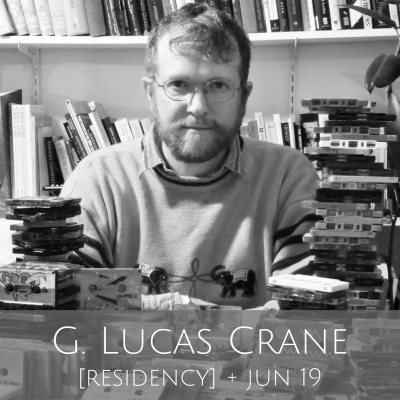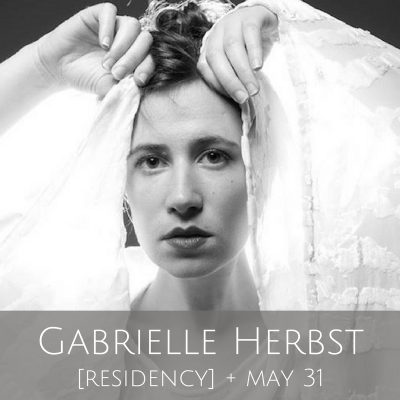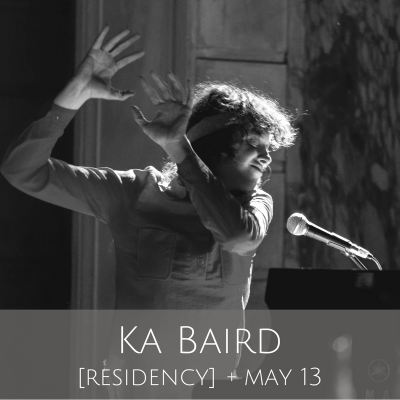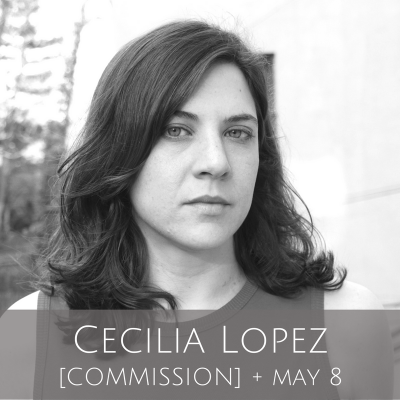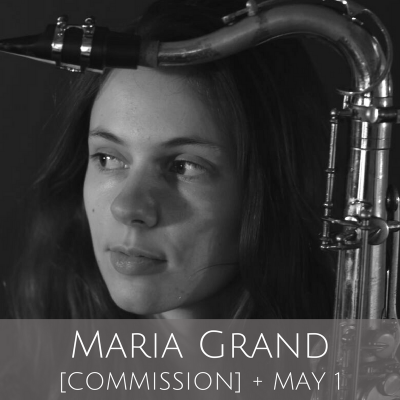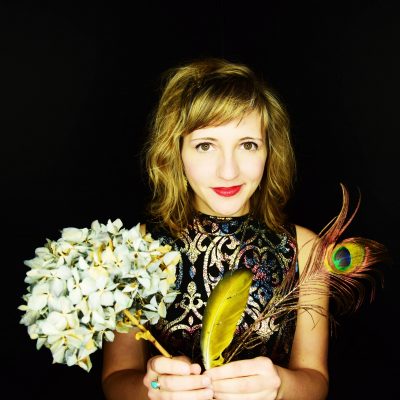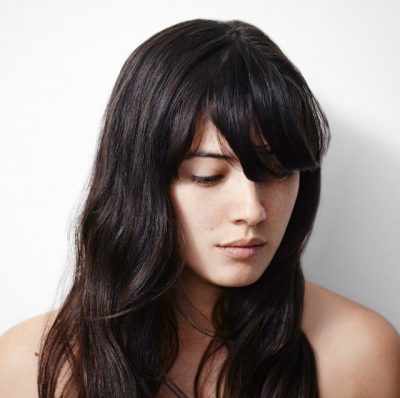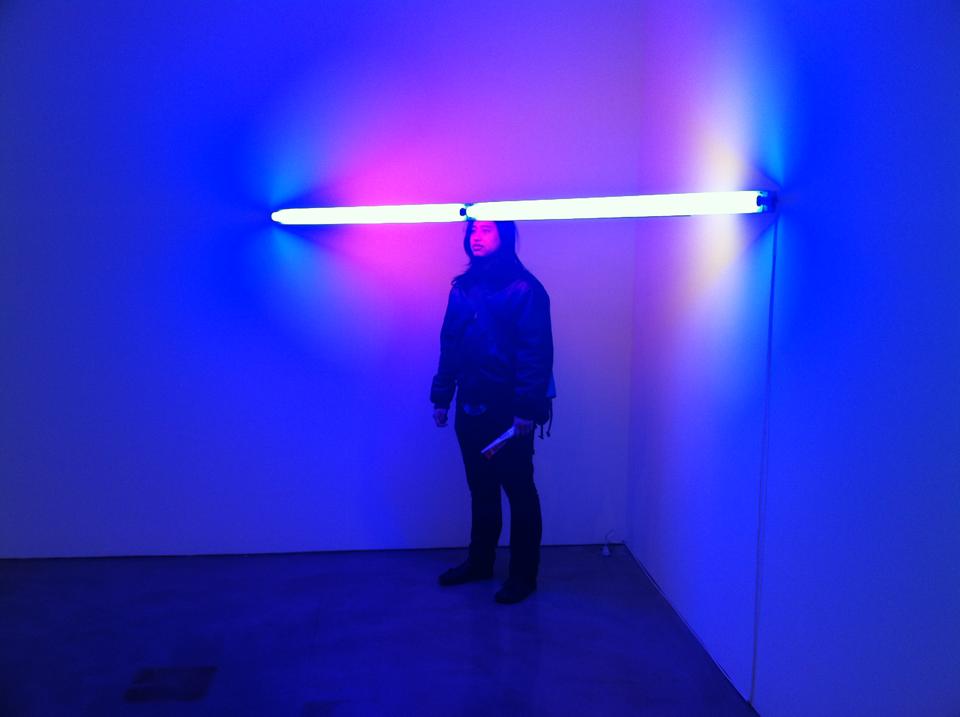[RESIDENCY] G Lucas Crane: Time Boiler
Tuesday, June 19, 2018 @ 8:00 pm
Tell us about yourself and what you do.
I’m a sound artist, musician, and performer, born and raised in Brooklyn, New York. I collage together sound steeped in magnetic tape aesthetics, and I use sounds on the common cassette tape as my instrument. I’m a tape DJ. An ancient and future sounds DJ.
I say “sound artist” here because through my sound practice, the process that I use to compose sound artwork is a spiritual, conceptual exploration of where I stand on the contemporary cyborg continuum, and I’m exploring those concepts in sound. As we externalize our nervous systems into increasingly sophisticated devices, synthesizers, samplers, sequencers; what is making the music at any given time? Making artwork today that uses recorded media as its source material, I feel like the contemporary information warfare zeitgeist we live in makes it important to be constantly critical about where your media is coming from and how much “integrity” it has as it relates to the self. I’m not a luddite or an analogue / digital purist by any means, I just want to know what’s going on, you know? Viscerally, physically, in the making of artwork. There’s something comforting about my media mostly coming from piles at my feet. I’m trying to remake recorded material from my life, and contemporary sensory life is replete with slick attention hijacking almost at every moment. So my work is kind of like performing anti-brainwashing rituals for myself. I have to admit I fail most of the time. Still, I can have the freedom to consider, in the time-bound folds of a tape loop, that time and life is not just for endlessly rushing forward consuming till death, I can create a space for revisiting the past, the ever cut-up present, and help divine the future through these musical processes. So that’s what sound art means to me, currently. Using attention to the sonic environment to fight the brainwashing.
I put “musician” here because regardless as to why I do anything with sound, I try to humbly situate myself amongst the world-spanning musical tradition, in that music as a craft is a pillar of human expression and the output of the daily plying of this trade has a relatable impact on all humans. So seeing oneself as a musician is in some way to try to recognize sonic impact over sonic intent and realize that “music” as a sound practice is located in the web of interconnected social fabric that exists between people making and listening to sounds as music. It’s really about something you do that someone else hears and the recognition of sound as a nonverbal communication medium, as well as an extremely intimate form of communication between practitioners. I really enjoy and get a lot out of this tradition of world walking bards, heads, jammers, tapers, nerds, weirdos, and citizen-musicologists, and I’m trying to ultimately make something that people listen to and get something out of (as opposed to, say, the conceptual motivations).
Lastly, I put “performer” here because the different mindsets that come with studio composition and live performance is important to my work, and I try to do a percentage of sonic decision making in a ‘live’ context. Non-live composition, especially for collage based media work I’m making, then becomes developing systems of sound relationships that have different probabilities of success or failure, and have these systems and decisions play out in a live setting. Performance is important to me as both a composition tool and social ritual. It’s a really potent human tradition.
Describe the project you are developing for Roulette.
I’m working on bringing something new for Roulette. New for me anyway. It’s called Time Boiler. Where I boil down some time. It’s an expansion of writing and music I’ve been making on the subject of time travel and ethics. Treating time travel and the mindset it requires as real and then working backwards from there to come up with how I remain an ethical human in all of that. How I remain myself. And how the time traveling mindset can reference and illuminate today’s society and the tyrannical control we are asserting over our reality and the reality of others. I think the practice and craft of music keeps one moral and honest, but that’s just me. For the past year I’ve been trying to expand my mind on the subject of time itself, which is sort of an outgrowth of my music practice in general. My music is made up of bits of sound from other times, and when I put them all together in real time, in a particular now, I feel the intense compression of time going into that moment, since my samples are frequently years old, mixed with things I just recorded. Music, as a medium ripped free of its mode as purely “personal expression,” is ultimately a “time binding” art form, where we fuse intent with what I consider a probing, a testing of reality via the body. Even when I don’t know who made a piece of music, I can hear it’s time-specific qualities, it’s made with machines and at a fidelity and style that correspond with a particular moment in time. Music is so hyper technological these days, that you can hear the time something is from via the the aesthetic qualities of the tech they are using. Even a recording of, say, a solo violin piece feels futuristic to me when recorded and reproduced in intense modern hi fidelity. if you reverse that consideration, it’s “a way to tell time” or to explore time. especially, I believe, right now! The act of making music is so time expansive, that during the act itself time does really weird stuff, shrinks down to where I’m exploring fractions of a second at the same time as focusing on an hour. This is almost a horrible insult to music in a way, as I’ve been speaking about music as collections of time and not how it sounds, but this is the most basic way I can try to understand what’s going on, since the sounds themselves are the things that conscripts my soul and makes for a compelling thing to listen to for others. There’s what you mix and then a how you mix it, and in my process the what, the actual sounds, grips me in the moment, leaving the how to be a more conceptual exploration of time, through how I make, organize, and relate to the tapes that I mix. I’ve just, lately, been thinking about what sound does to me and that leads to considering when it comes from, what it is, where every piece of the sound has an origin in thought or in time. I’ve been making sound work about this experience, which I feel like leads nicely to the recursive nature of my work in general; time chunked up and remixed, about time, in a time. So this new piece Time Boiler is my attempt at synthesizing these concepts into a performance.
And speaking about the performance, it’s important for me to use this opportunity at Roulette to attempt something that could only happen here, this being about time there has to be a trail aspect to the performance, so I’m setting up a few precarious musical feats I have to pull off and there’s no guarantee I’ll succeed. I mean I can practice, but there has to be this aspect of “even a failure will be specific to this time here.” I’m “racing against the clock” like we all are if we let ourselves. And the good thing is that any failure will just be another piece of music to the listener. No ones dying on a table if I can’t pull this piece off.
Another idea I’m exploring in Time Boiler is that of the rarified time object. Since I work with cassette tapes to hold my samples, there’s this solid touchstone aspect to sound that over the years of playing various samples I start to get really attached to specific tapes. Like I fetishize them to an unhealthy degree. So for this piece, I’m exploring making the tapes super crazy to the point where they could be treated like holy objects. There are only one of these tapes, and that weird sacred quality will then extend to the sounds that I put on these tapes, and these qualities will extend into affecting how I situate these samples into the overall composition and performance. I like relating to each sample as a physical object. I find it to be a mentally healthy consideration to have with sound. I get really angry sometimes at all the samples I have on my computer, like “what are you even doing in there in that dumb place.” Just numbered files sitting in a list in a simulacra of a folder in a box. Putting them on tapes frees me to really play with them, juggle them, get a physical grip on them. And making them increasingly crazy looking then effects how I come to feel about them and subsequently how I play the sounds contained therein in a piece of music. I’m trying to unite all the different factors of what truly goes into my musical performance moment to moment.
What is it like living and working in New York City?
Well I’m from here, from right here on 3rd Avenue! So it’s like home to me always, and I have to constantly remind myself to not feel too at home too much of the time because the reality of New York City as a place people move to to work on their lives is starkly different. I want to be able to put myself in people’s shoes. That’s the advantage of living in this city — people and their lives are all around you and you have a better opportunity to learn about people and experiences that are different from yours. The sheer scale of this quality is mind-boggling and unlike anywhere else. New York City, it’s got SHEER SCALE, with everything, the bad and the good. I’m pretty into people and what they do, I’m anti-misanthropic, and so this city is great and curious to me. You also have the opportunity to experience first hand how shitty a city can be to its people and how shitty people can be to each other, and that’s a different learning experience. This scale of human potential and depravity is deeply spiritually educational, and it’s a stark experience. When I go other places these realities are muted and more hidden in their locally specific ways, and I get pissed off and bored. I’m sort of a city rat, a creature of New York. In that way I’m kind of naïve and spoiled. I find any other place than New York City to be deeply exotic. “Oh so your clean trains turn off at night? Huh, wow. Crazy.”
What are you really excited about right now?
My dreams are crazy right now. Like full on sci-fi wonderland dreams with sequels and reboots. It’s making me question my memory and my waking life. My memory of these dreams is so intense, but it always comes with the feeling that these memories can only ever be half the story, or a third of the story. Are my dreams lies? Mis-remembered? Are they nonsense? Are they deeper truth? How could a labyrinth made of creosote logs that is also a submarine lit with jars filled with fireflies have some deeper truth? Or are the stories that affect me like what happens in my waking life? I’m psyched about this — its going to take me the rest of my life to figure out. I suppose it’s something we all have to reckon with, but I’m excited about it. I’m probably going to make some sort of…card game?…out of my dreams. Not sure. It’s going to sound funny but I’m really excited about how the human mindset is reacting to contemporary technology and how its going to require this intense criticality about what kind of information we take in to even survive with a sense of self, it’s already happening and these last few years has really shown that the casual violence of human communication can be harnessed into a psychic environment that conscripts us all. So that usual background notion of achieving or living in some type of “freedom” is going to be harder and harder to find without a new generation of intense criticality about what we take in and how. I have hope it’s going to lead to actual resources for leading a healthy life, because we all know how good the internet is for getting the same old poison into our psychic systems. So I would like to focus on and promote the good tools, not the bad. And I’m excited that it will be harder and harder to ignore the bad parts of human society. It’s all coming out now. The masks are slipping.
What’s your absolute favorite place in the city to be and why?
Wandering, just wandering around everywhere. The places I really like are the connective tissue of the city. I just like sitting on a random bench somewhere. I like going into a places I’ve never been. Rejecting what the phone tells me.
How did your interest in your work begin?
For me, there is a strong mental relationship between sound and narrative. Successions of sounds are sentences; a song is a paragraph. Sound as text. I started off when I was younger in love with words and what they do, their limits and advantages. Every sound I work with evokes some sort of story to me, but this is distinctly related without using words. It’s incredible that smashing sounds together can do this through the medium of the human brain, and my work is an attempt to plumb the depths of this relationship. Articulation can achieve clarity but kill innovation; saying something well trumps saying something of substance, etc. sound is a medium of different possible meanings existing in the same moment in time. Articulation with words fixes its nature, collapsing meaning back into an either/or realm that we are trained for. Even recording sound onto media fixes its nature and allows it to be remixed, further collapsing its potential meaning. I’m interested in sound recordings as texts of my memory and fragments of my own story, but I’m trying to discover associations that will lead me into my own future by cutting up and collaging my past. I’m extremely interested in forging a path through sonic art despite my training being firmly outside musical tradition and training. I think there’s a way to approach sound art as story making, and even if I sound like an idiot along the way, I’m interested in the outcomes of working deeply with these tools and concepts.
What is influencing your work right now?
Time travel and the chasing down of what it means to be an at a particular moment in time, and how we go about relating to our past and future selves, who we can only experience in the present. Trying to expand my consciousness through complex performance rituals and the time-specific concepts of hope vs. truth in time and as it relates to how we live half on and half off the Internet now, where time is compressed. To do something even if you can see into the future, is to have hope, to have an audacity, a type of insanity. The truth of things might be hopelessly cynical and rational and risk-averse, being right on the Internet now stands in for action or community, but hope for a better world and the values that hope requires still are important, even if you have a time machine and have tried and failed a hundred times to change the past, or see the future that might be inevitable. You still have to try, un-cynically. I might never make the nicest, most palatable music manhandling my sound memories on tape, but I can exemplify the seeking values of wonder by experimenting.

